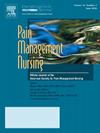表达性触摸和音乐对疼痛、生命体征和脑氧合的影响:与临床试验相结合的混合方法研究。
IF 1.6
4区 医学
Q2 NURSING
引用次数: 0
摘要
目的: 应使用主观方法来评估疼痛。了解疼痛对生命体征和脑供氧的影响非常重要。本研究旨在确定腰椎间盘突出症手术后应用表达性触摸和音乐对疼痛、生命体征和脑供氧的影响:设计:这是一项融合、平行、混合方法的研究,采用了随机对照试验和半结构化定性访谈:通过功率分析,132 名患者(44 名:表达性触摸,44 名:音乐,44 名:对照组)被纳入研究。32名患者被纳入定性研究样本。表达性触摸和音乐干预重复进行 3 次。干预前后记录了疼痛、生命体征和脑氧饱和度值。干预后收集定性数据:结果表明,与对照组相比,表达性触摸和音乐能明显减轻患者的疼痛程度(X2:67.118),(p < .001)。研究发现,富有表现力的抚摸和音乐在呼吸(X2:15.289)、血压(X2:8.754-8.706)、饱和度(X2:47.953)和脑氧饱和度(X2:31.473-37.110)方面产生了显著差异(P < .001)。在疼痛和脑氧合方面,音乐比抚摸更有效。结论:结论:研究发现,表达性触摸和音乐能有效减轻疼痛程度,将生命体征控制在生理范围内,并增加脑氧合。还需要进一步研究术后疼痛治疗中使用的其他方法对脑氧合的影响。本文章由计算机程序翻译,如有差异,请以英文原文为准。
The Effect of Expressive Touch and Music on Pain, Vital Signs, and Brain Oxygenation: Mixed-Method Study with Clinical Trial
Purpose
Subjective methods should be used to evaluate pain. It is important to know how pain affects vital signs and brain oxygenation. This study aimed to determine the effects of expressive touch and music applied after lumbar disc herniation surgery on pain, vital signs, and brain oxygenation.
Design
This was a convergent, parallel, mixed-methods study utilizing randomized controlled trials and semi-structured qualitative interviews.
Methods
With power analysis, 132 (44: expressive touch, 44: music, 44: control) patients were included in the study. Thirty-two patients were included in the qualitative research sample. Expressive touch and music interventions were repeated 3 times. Pain, vital signs, and brain oxygenation values were recorded before and after the interventions. Qualitative data were collected after the interventions.
Results
It was determined that expressive touch and music significantly decreased the patients’ pain levels compared to the control group (X2: 67.118), (p < .001). It was found that expressive touch and music created a significant difference in respiration (X2: 15.289), blood pressure (X2: 8.754-8.706), saturation (X2: 47.953), and brain oxygenation (X2: 31.473-37.110), (p < .001). Music was found to be more effective than expressive touch on pain and brain oxygenation. The interventions relaxed and distracted the patients.
Conclusions
It was found that expressive touch and music were effective in reducing pain level, keeping vital signs within physiological limits, and increasing brain oxygenation. Further studies are needed to examine the effects of other methods used in postoperative pain management on brain oxygenation.
求助全文
通过发布文献求助,成功后即可免费获取论文全文。
去求助
来源期刊

Pain Management Nursing
医学-护理
CiteScore
3.00
自引率
5.90%
发文量
187
审稿时长
>12 weeks
期刊介绍:
This peer-reviewed journal offers a unique focus on the realm of pain management as it applies to nursing. Original and review articles from experts in the field offer key insights in the areas of clinical practice, advocacy, education, administration, and research. Additional features include practice guidelines and pharmacology updates.
 求助内容:
求助内容: 应助结果提醒方式:
应助结果提醒方式:


